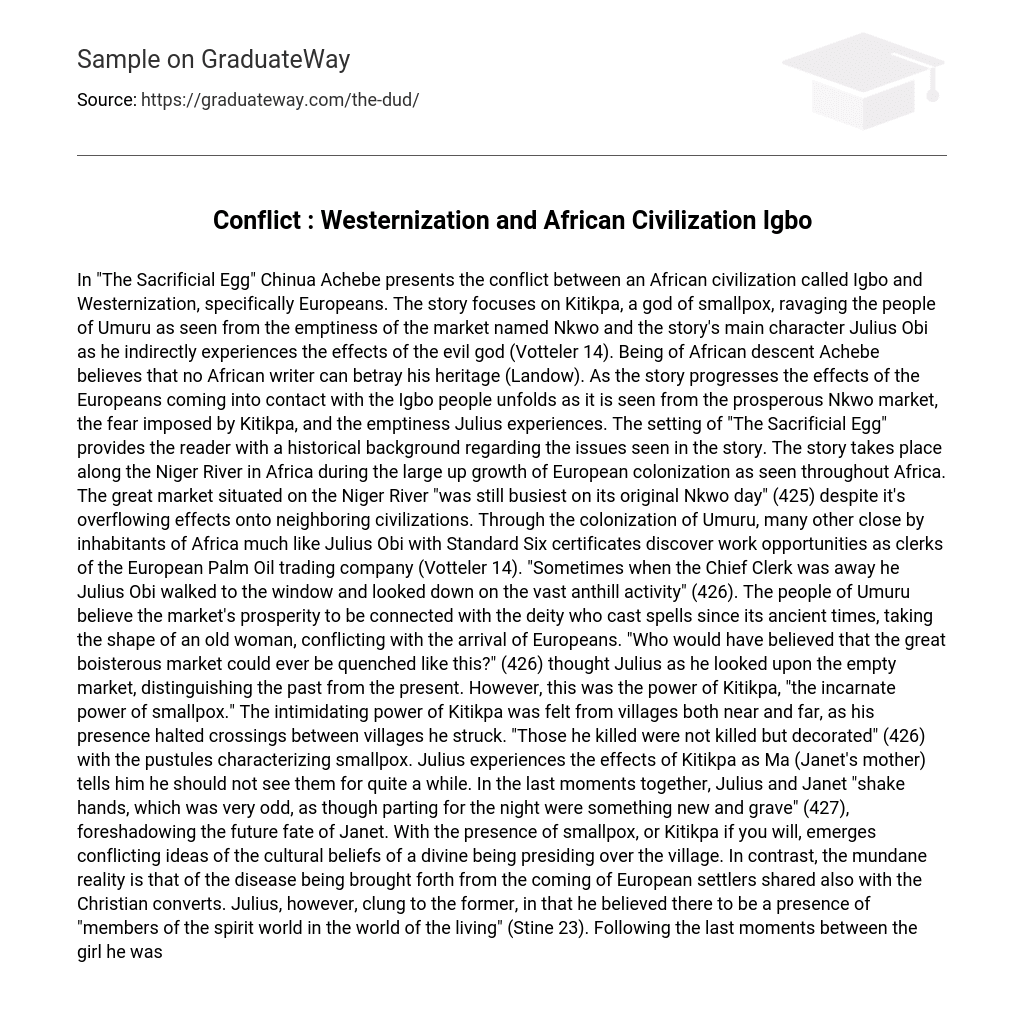In “The Sacrificial Egg” Chinua Achebe presents the conflict between an African civilization called Igbo and Westernization, specifically Europeans. The story focuses on Kitikpa, a god of smallpox, ravaging the people of Umuru as seen from the emptiness of the market named Nkwo and the story’s main character Julius Obi as he indirectly experiences the effects of the evil god (Votteler 14). Being of African descent Achebe believes that no African writer can betray his heritage (Landow). As the story progresses the effects of the Europeans coming into contact with the Igbo people unfolds as it is seen from the prosperous Nkwo market, the fear imposed by Kitikpa, and the emptiness Julius experiences. The setting of “The Sacrificial Egg” provides the reader with a historical background regarding the issues seen in the story.
The story takes place along the Niger River in Africa during the large up growth of European colonization as seen throughout Africa. The great market situated on the Niger River “was still busiest on its original Nkwo day” (425) despite it’s overflowing effects onto neighboring civilizations. Through the colonization of Umuru, many other close by inhabitants of Africa much like Julius Obi with Standard Six certificates discover work opportunities as clerks of the European Palm Oil trading company (Votteler 14). “Sometimes when the Chief Clerk was away he Julius Obi walked to the window and looked down on the vast anthill activity” (426).
The people of Umuru believe the market’s prosperity to be connected with the deity who cast spells since its ancient times, taking the shape of an old woman, conflicting with the arrival of Europeans. “Who would have believed that the great boisterous market could ever be quenched like this?” (426) thought Julius as he looked upon the empty market, distinguishing the past from the present. However, this was the power of Kitikpa, “the incarnate power of smallpox.” The intimidating power of Kitikpa was felt from villages both near and far, as his presence halted crossings between villages he struck. “Those he killed were not killed but decorated” (426) with the pustules characterizing smallpox. Julius experiences the effects of Kitikpa as Ma (Janet’s mother) tells him he should not see them for quite a while.
In the last moments together, Julius and Janet “shake hands, which was very odd, as though parting for the night were something new and grave” (427), foreshadowing the future fate of Janet. With the presence of smallpox, or Kitikpa if you will, emerges conflicting ideas of the cultural beliefs of a divine being presiding over the village. In contrast, the mundane reality is that of the disease being brought forth from the coming of European settlers shared also with the Christian converts. Julius, however, clung to the former, in that he believed there to be a presence of “members of the spirit world in the world of the living” (Stine 23). Following the last moments between the girl he was going to marry, Julius walked up and down the bank of the river rather than heading straight home, “because he wanted desperately to cling, even alone, to this strange parting” (427). As Julius hurriedly sets out for home, the night-masks swirl past him in the dark; he steps on an egg that has been sacrificed (Votteler 14).
“Such was the state of the town when Kitikpa cameto demand the sacrifice the inhabitants owed the gods of the soil.” (426) Surrounding the crushed egg were decorative palm-fronds, however, Julius perceived the entire visual before him as another house to which the terrible artist began work. The egg represents Janet and Ma, as insinuated by Julius’s own perception of the accident, perhaps even an egg sacrificed by either of the two to a greater extent. The emptiness Julius looks upon in the market throughout the extent of the story while reminiscing of former days represents the feelings he feels inside. He feels desolate, empty, lost. “It was barely a week agoon this side stood Julius, and on the other Ma and Janet whom the dread artist decorated.” (428) Despite the goods and riches that came with the Europeans, it still brought problems much like the case of England’s Black Plague. As the reader, one can perceive the egg as being the protector of a life, or lives; or the entire incident can be viewed as being a coincidence clashing with the problem of smallpox.
With his and the village’s conflicting beliefs, Julius may never completely understand what has happened and why. The influence of Achebe’s strong cultural feelings is evident in “The Sacrificial Egg”, stating, “unless our culture begins to take itself seriously it will neverget off the ground.” (Landow) The conflict between beliefs held by generations is presented and gives light to situations occurring to this day (Stine 23).





